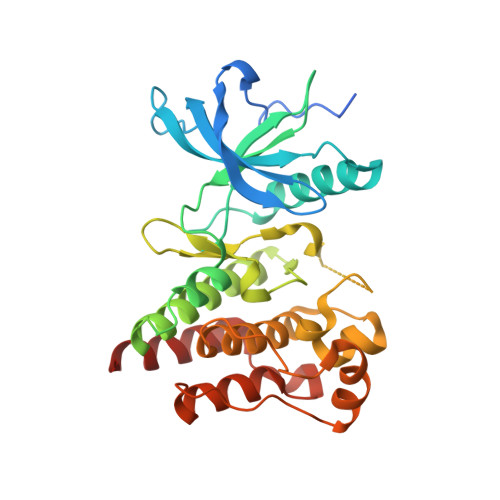Elucidation of a four-site allosteric network in fibroblast growth factor receptor tyrosine kinases.
Chen, H., Marsiglia, W.M., Cho, M.K., Huang, Z., Deng, J., Blais, S.P., Gai, W., Bhattacharya, S., Neubert, T.A., Traaseth, N.J., Mohammadi, M.(2017) Elife 6
- PubMed: 28166054
- DOI: https://doi.org/10.7554/eLife.21137
- Primary Citation of Related Structures:
5UGL, 5UGX, 5UHN, 5UI0 - PubMed Abstract:
Receptor tyrosine kinase (RTK) signaling is tightly regulated by protein allostery within the intracellular tyrosine kinase domains. Yet the molecular determinants of allosteric connectivity in tyrosine kinase domain are incompletely understood. By means of structural (X-ray and NMR) and functional characterization of pathogenic gain-of-function mutations affecting the FGF receptor (FGFR) tyrosine kinase domain, we elucidated a long-distance allosteric network composed of four interconnected sites termed the 'molecular brake', 'DFG latch', 'A-loop plug', and 'αC tether'. The first three sites repress the kinase from adopting an active conformation, whereas the αC tether promotes the active conformation. The skewed design of this four-site allosteric network imposes tight autoinhibition and accounts for the incomplete mimicry of the activated conformation by pathogenic mutations targeting a single site. Based on the structural similarity shared among RTKs, we propose that this allosteric model for FGFR kinases is applicable to other RTKs.
Organizational Affiliation:
Department of Biochemistry and Molecular Pharmacology, New York University School of Medicine, New York, United States.
















